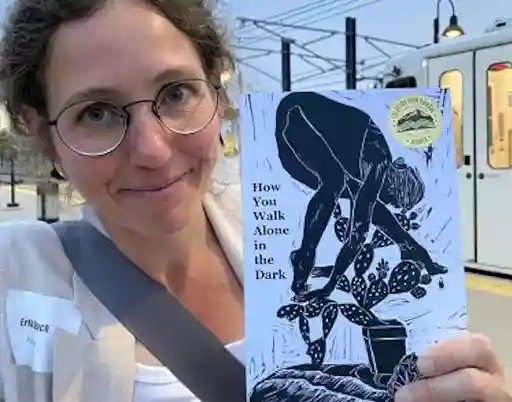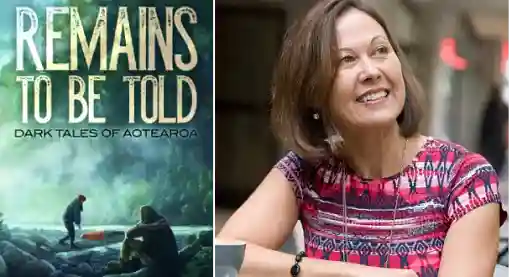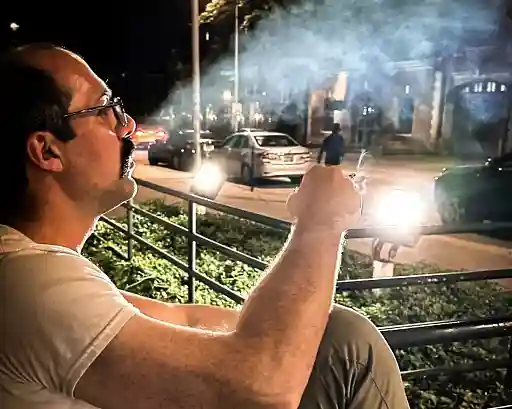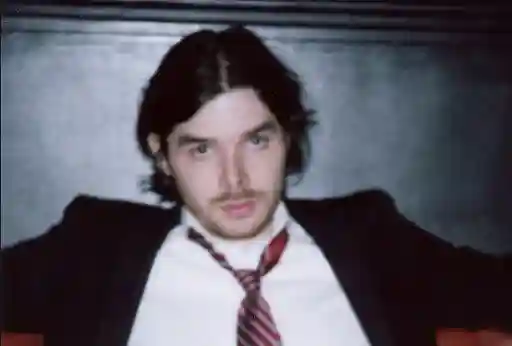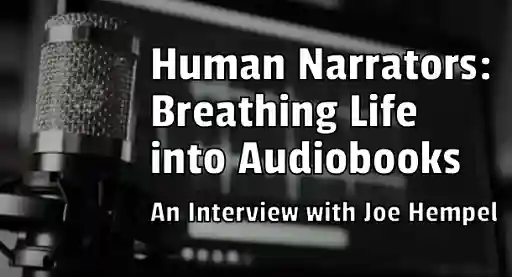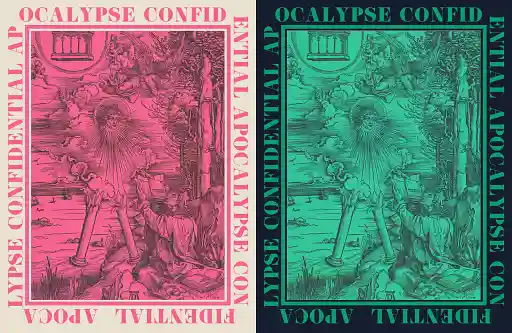Here's something that's a little funny, or maybe a little sad: I come from a crime fiction background and I've never read Chelsea Cain. I've read all her friends—Monica Drake and Chuck Palahniuk and Suzy Vitello and Lidia Yuknavitch—the members of that too-cool Portland literary clique we hear so much about. But Chelsea's work, which is supposed to be in my wheelhouse, eluded me.
Then I picked up One Kick, and I tore through it in two days. It's one of the best books I read this year. I still can't get over the ending. It's hard, and it's dark. I can see some people having a hard time with it—but Chelsea earns it. It's hard to earn an ending like that.
And the book is an incredible marriage between craft and pulp—it's fun and funny and badass, and incredibly heartfelt and thoughtful in dealing with some very weighty issues.
The book is about Kick Lannigan (also awesome: that name), who was abducted as a young girl, and after she was rescued, trained herself to be safe—martial arts, lock-picking, knife-throwing. Like if Elizabeth Smart became a mercenary. And one day she's recruited by a former weapons dealer to use that new skillset to track down missing children.
And now, here to talk a little bit about her writing process, the one true secret to writing success, and the dangers of a crashed hard drive for crime fiction writers, is Chelsea Cain...
What was the first story you ever wrote, and what happened to it?
I spent my early childhood on a hippie commune and my parents didn't want to limit my potential with the tyranny of the alphabet. I was in kindergarten before I learned to read and write, old enough that I remember looking at words in books, passing road signs, seeing billboards, and the mystery and promise that those strings of letters held. I remember the energy of words. I had gone to a "clothing optional" daycare which was really groovy but not very academically oriented, so I was hungry to read. On the first day of school the teacher announced that we could each pick out any word we wanted and she would teach us to spell it. Oh the heady power, the joy! I was overcome. Every other kid in that class chose his or her name, which was obviously the most practical choice. I chose the word "flower." (I know. So predictable, right?)
The teacher wrote our words on index cards and gave them each to us. There are those moments in your life that define you. I could draw a layout of that classroom. I could tell you where I was sitting on the rug when she handed me that word. I can see the word in my mind right now, each word written in black sharpie, each letter an inch high. She gave me a word! It was the best present I've ever gotten. I treasured it. I spent hours copying the letters, burning that word into my brain. I carried the index card around everywhere I went until it was as soft as cloth. It was, as she had promised, the first word I learned to spell. It was also, a few months later, the title of my first book. It was a picture book, drawn with crayon on index cards. I quote, "There was a flower, and it grew, and grew, and grew, and grew, and grew and grew and grew." It went on for awhile. I still had a little bit to learn about plot. (I have no idea what happened to it.)
When you sold your first piece of writing, how did you celebrate?
My first stories sold for $15 or $25 apiece, so I celebrated by putting gas in my car. When I was twenty-four I sold a book called Dharma Girl (a memoir!) to Seal Press. My life hitherto. It wasn't really a memoir, it was just non-fiction about a road trip my mom and I took back to that hippie commune I mentioned earlier. But it was sold as a memoir, and it got a disproportionate amount of attention. My advance was $1,000, which is not exactly life changing. But having that book published saved my life. I checked my voicemail one day at grad school and there was a message from my aunt saying that my mom's cancer had metastasized and then right after it was a voicemail from an editor wanting to publish my book. That was an interesting five minutes. I went home to Portland, moved in with my mom, and edited Dharma Girl while she was dying. It kept me sane, as much as a person can be kept sane in a position like that. My mom died three months before the book came out, but she got to see an advance copy. She got to see me as the person I would become—a writer. I toured all over to promote that book, I drove thousands of miles. So I guess the money for that book went to pay for gas too.
Tell us about your process: Pen, paper, word processor, human blood when the moon is full... how do you write?
I want so badly to give you a smart ass answer, but I'm going to be a grownup and answer honestly. I write the whole first draft in calligraphy, using a special ink made from the liquefied fat of infants. Shit. See? I can't help myself. I write on a MacBook Air, which I don't recommend because I happen to know that the solid state hard drives are a bitch to recover data from should you, say, suffer a hard drive crash due to mechanical failure. But man, those Airs are pretty. And so slim! I have written all my books on Mac laptops. I wrote Dharma Girl on the first generation of Mac laptop. It had a monochromatic display and was like four inches thick. It looked like a lunchbox. I need isolation when I write but I can write in a room full of shrieking children. Does that make sense? As long as they're not shrieking at me, as long as they don't want juice or anything. I just need to be left alone. I have an office on the third floor of our house. I call it the third floor, you might call it "the attic." All the walls are wonky and slanted. Sometimes I feel like a Barbie doll crammed into a very small dollhouse, completely oversized, with knees that don't bend and too much hair. But there's a bathroom up there and even a guest room off of the main room where I work, so it's like having my own apartment. One of these days I'm going to get a coffee maker and a mini-fridge and then my family may never see me again. I spend most of the day sitting in a Windsor desk chair that an old family friend made me at a chair-making-camp in New Hampshire. It took him two weeks, and he wasn't allowed to use power tools. It's unpainted, unstained, and looks deeply uncomfortable but it's the best chair I've ever had.
My husband and I have a nine-year-old daughter. He does drop-offs and I do pick-ups. So we get up and get her ready and then they leave and I finish reading the newspaper, fill my coffee cup and head upstairs. My husband also works at home, but he works in the basement. I generally live in a story for a few months before I start writing it. I daydream and let things cook. I don't even take notes until I can smell the thing baking in the oven and know it doesn't stink. At that point anything I forget isn't worth remembering. Once I hit a tipping point I'll start scribbling down notes in little notebooks I carry in my purse or on the back of my checkbook or on a receipt or whatever I have handy. It really doesn't matter where I write it down because I immediately lose track of it. But the exercise of writing it helps it stick in my head. At about this same time I'll start a word document (or Pages doc in my case) and I'll start braindumping all of the stuff in my head. By the time I'm ready to write I'll have ten or fifteen half-formed docs going. I abandon most of them as soon as a I walk away from the laptop. But each time I start a new one the story gets a little tighter—I'll draw connections and find plot twists. The act of summarizing and re-summarizing helps me work out the story. It also gets my brain working so that maybe hours after I walk away from the computer some solution will strike me. I also try to be a sponge during this early period—reading crime stories, non-fiction (anything—I just need information, some spark that will start the fire). I watch people, and try to make note of their uniquenesses, gestures, expressions, tics, stance, anything I can recycle and use as my own on the page. I live in the world differently. My antennae are twitching. I may write some of this stuff down, but not in any organized or useable way. Mostly I am working a muscle. I'm getting in shape. Then I start writing.
I write lean. Some writers over produce and then have to edit down and basically find the story hidden under all the words; I'm the opposite—I underwrite. It's not like I'm agonizing over every word. I just sketch. Then I go back and add shading and redraw lines, and finally add color. (How many metaphors have I used to describe writing in this answer already, six?) When I sit down to write a chapter I generally write the dialog first. Unattributed. So it looks like a really poorly executed screenplay. If I can get out what the characters are saying, and maybe a few action notes, then I can see the shape of it. I have a draft. I'll do a few chapters like this and then go back and start fleshing everything out. Often times I'll replace some of the dialog with gestures or find some other way to express it besides saying it, but it really helps me to have it on the page. It's a starting point. I have a book due a year so I have to write when I don't want to. I can't just wait for those days when I'm filled with excitement to sit down in that Windsor chair. Because if I did I wouldn't make my deadline And there's always a point about halfway through the book when I am seized by panic and completely convinced that I cannot finish the book.
Writing a book in insane. It is very important that you try not to remember that. But sometimes it sneaks through—that pesky reality. Writing a book is a fucking ludicrous idea. All those pages? Are you kidding me? Every year I think, I'm going to quit. I can't do this. They are going to find out I'm a fraud. It's what happens next that's important. Are you ready? Because this is the secret—the secret to being a writer, or at least making a living as one, and when you ask a question like "What's your process?" that's what you mean, right? You mean, "Tell me your trick." Most writers make up some bullshit answer to that—like writing 500 words a day, or writing in bed, or leaving off in the middle of a sentence—but I am going to tell you the truth. Why? Because if you have read through this whole long rambling answer then you are serious about writing, you have passed the test. Here is the secret—and it's not just true for me, it's true for every single author since the beginning of time—the answer is: self-delusion. I'm serious. That's the key to writing a book. Narcissism. Denial. Blind self-confidence. Whatever you want to call it. You have to make yourself believe that you can absolutely write a book. Ignore all signs to the contrary. People write books everyday—go to a library—there are SO many books! Are those assholes on the spines any different than you? No. They just convinced themselves that they were. They didn't give up when they should have. Every day when you sit down to write, tell yourself that this is perfectly normal. You can totally write a book! It is amusing that you ever questioned yourself! Quiet the voices in your head—the ones that tell you to get a job or take a shower or learn how to use a semi-colon. You will get so much more work done.
What's the biggest mistake you've made as a writer?
I referenced specific dates in my first thriller, Heartsick. Such a simple mistake, and such a rookie move. I didn't even think about it at the time. It's a book about hunting a serial killer so I had listed the dates (days, months, years) of murders, and I had dates related to previous crimes and to the detective's background. And worse yet, I told the reader the present day date. I realized that I was a bonehead as soon as I sat down to write the second book. Heartsick took place in the fall of 2007, so that the events lined up with the present day of the people reading it. The second book takes place 2 months after the events of the first book. But it would come out a year after the events of the first book. So people would be reading it in the fall of 2008, but technically the "present day" of the book would be the late fall of 2007. There would be so much math! Plus it would just get more mind bending with every book. Also I turn in the books a year before they're published, so ... my head hurts just thinking about it. I didn't want to have each book take place a year after the previous one (which would have solved the problem) because my characters would all get old and die. So I just ignored it. Because that's what I do — self-delusion, right! I pretended that I'd never mentioned any date. And from then on you'll notice that I am almost comical in my commitment to avoiding them. When I reference past events, they happened "about ten years ago," or "the summer before last," or "around Christmas" or "before Archie's children were born." Avoiding dates also allows readers to feel present in the story for a longer period. It doesn't feel like a period piece so quickly. Heartsick will always take place in 2007. The five other books (so far) in that series will take place whenever someone reads them.
What kind of catharsis did you achieve from your latest work?
I nearly cracked from the pressure. Like serious Judy Garland level mental breakdown. When celebrities announce that they are being treated for "exhaustion"—I get that now. But it was the best thing that could have happened, as trite as that sounds, because it forced me to make changes in my professional life and set some boundaries and get back to what this is all about, writing. Anyone crazy enough to write a book is, after all, crazy. The trick is staying functional enough to do the work, because it's the work that keeps me sane. That sometimes creates an interesting loop.
Which fictional character would you most like to have a drink with, and why?
Doctor Who. Ideally the 10th incarnation. If you have to ask why, then you won't understand.
Where do you buy your books?
Mostly I buy books at Powell's City of Books (the downtown store, and also the branch on Hawthorne Ave, which is near my house). But I also buy books at every bookstore I walk into. Being an author is like being an alcoholic bartender. My profession puts me in the path of temptation. And I am poor at resisting temptation.
How do you handle a bad review of your work?
I love to be praised. I prefer it to being attacked. And I have been really really fortunate to have written books that have been well-received and widely reviewed. Most of the time I'm just giddy at the fact that someone at the NYTBR or Boston Globe considers my work worthy of review at all (they haven't figured out I'm a fraud yet!). I'm not one of those authors who doesn't read reviews. I read all the reviews. I should couch that a little. I try to stay away from Amazon reviews (and their ilk) because I have no context for any of them. Who are these people? Are they just having a bad day? Are any of them parents of my daughter's friends? You can see how this gets dangerous. I read some blogger reviews (if someone tags me for instance, or if someone else sends me a link, or if it's a blogger I follow). But I don't sit around and Google myself to see what the Internet is saying because that really works against my whole self-delusion strategy. So I should say that I read all the newspaper reviews. I guess that makes me old, doesn't it? As strange as this sounds I have gotten some great advice in reviews. I'm lucky. I write a series. I get a do-over every year. So I am always interested in useful feedback. There was a Washington Post review of Sweetheart (the second book in the series) that was "mixed," which means the guy didn't really like it but threw in a few compliments to soften the blow. He called me out on some narrative tics (reusing phrases and descriptions) and took exception at some of my word choices. He quoted lines that, out of context, came off as downright silly. I agreed with all of it! He nailed it. What's more, it was a really funny and well-written review. I enjoyed reading it. In fact—here's how green I was—I emailed him! It was the book editor so his email was online. I sent him a fan letter! I said that I thought his review was terrific and that I appreciated his critique! He was mortified. He wrote back, but I could tell he was completely weirded out. Who writes thank you notes after a negative review?! Me, I guess.
What's the worst advice you hear authors give writers?
I'm pro-advice. Even the stunningly moronic variety. Because the writing profession is vast and varied and we all take different paths and there might be a person out there for whom stunningly moronic advice will make all the difference. Advice is like UV radiation. Go forth! Absorb it! Tan! Some of you will get skin cancer.
WILDCARD: You cover a lot of heavy and complicated subjects in One Kick: guns, self-defense, lock-picking, child abduction and pornography. Clearly a lot of research went in to this—did you ever feel like you were falling too deep down the rabbit hole? And did you find anything down there that surprised you?
My hard drive fried a few months ago and I had to send my laptop to a data recovery company in Northern California. These are the specialists — like calling in the A-Team. If your computer goes down on a sinking ship and is recovered at the bottom of the ocean two years later covered in barnacles these are the people who can recover your data for you. I was on the phone with one of their guys, kind of a crisis counselor/customer rep, and I was about to hang up and suddenly it occurred to me that if they did manage to recover my data they might see my internet search history. "Um, there's something you should know," I said. And I proceeded to explain that I was an author and not actually planning to abduct children or hurt anyone at all despite the fact that I had searches like "how to build a secret room" and "chloroform" and "best ways to kill someone with a knife". My internet searches always lead me to interesting places and if I have learned anything it's that the answers to the mysteries of the universe are all out there somewhere if you ask the right question in the right search field.

About the author
Rob Hart is the class director at LitReactor. His latest novel, The Paradox Hotel, will be released on Feb. 22 by Ballantine. He also wrote The Warehouse, which sold in more than 20 languages and was optioned for film by Ron Howard. Other titles include the Ash McKenna crime series, the short story collection Take-Out, and Scott Free with James Patterson. Find more at www.robwhart.com.
